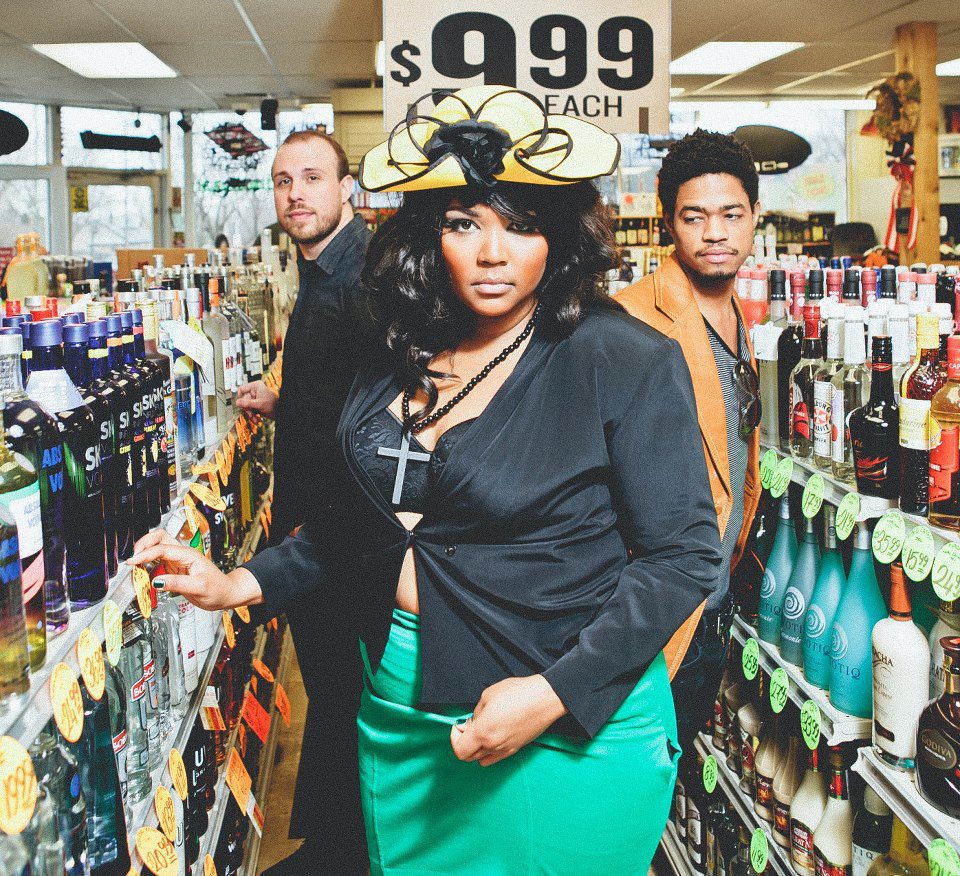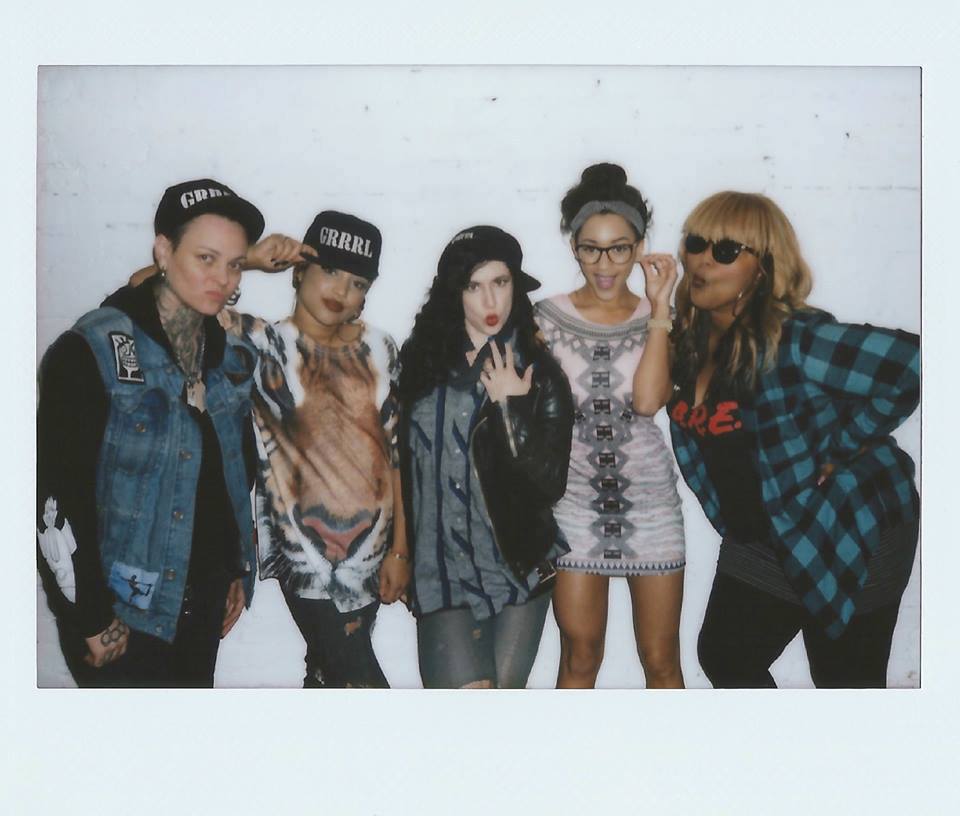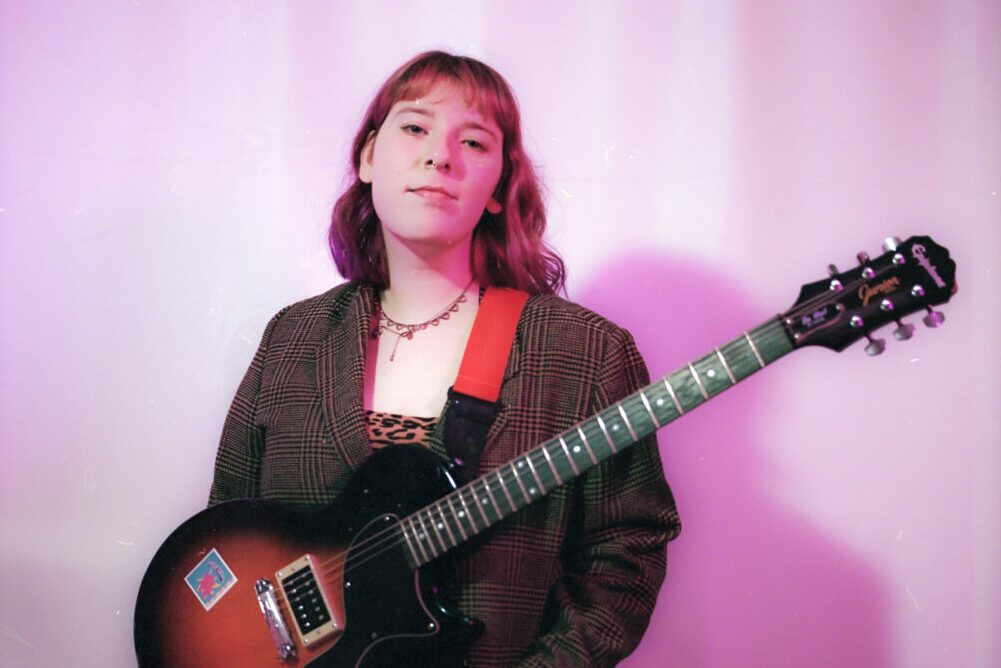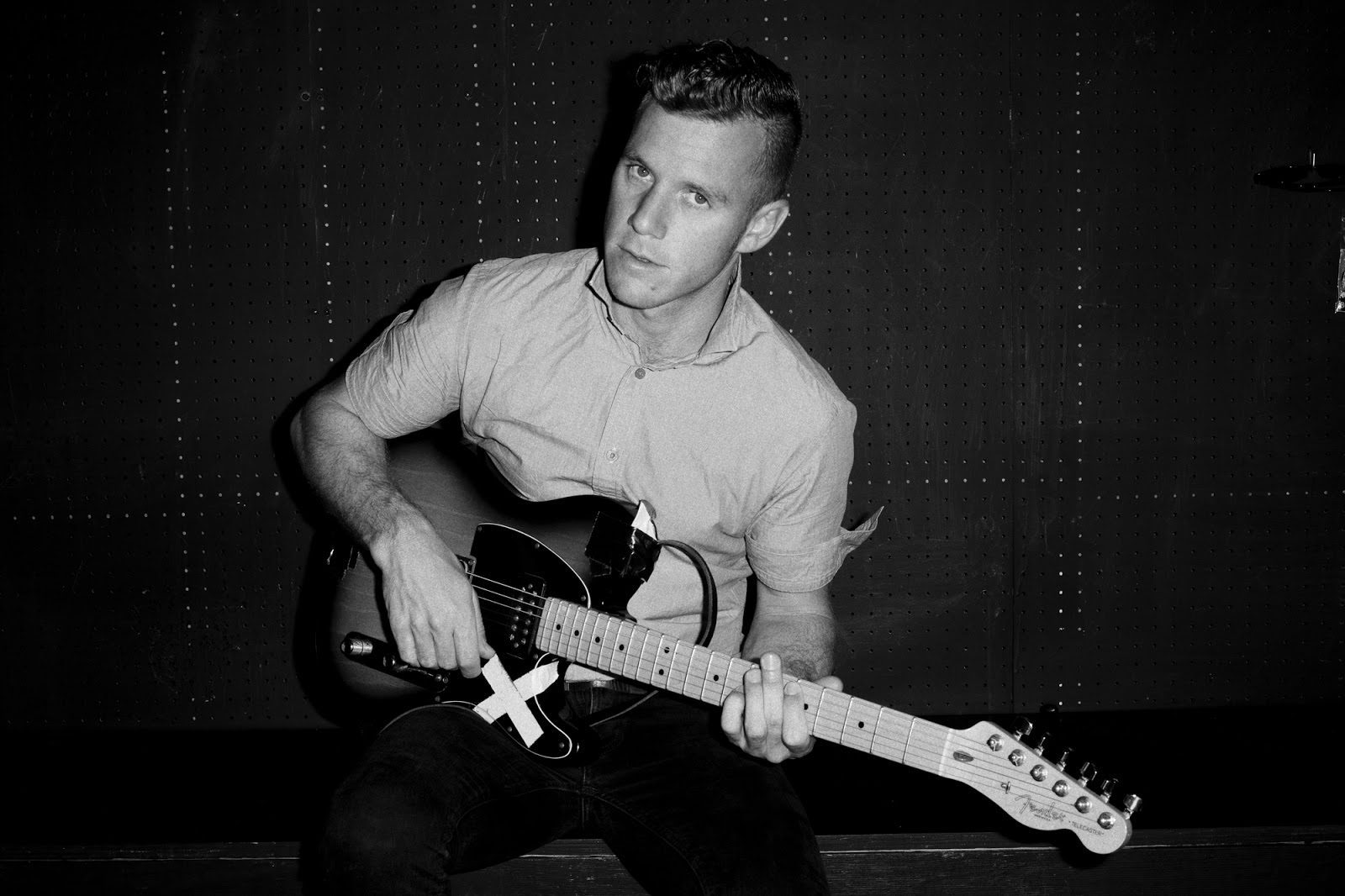Femme Unfiltered: Lizzo

Twice a month, audiofemme profiles artists both emerging and established, who, in this industry, must rebel against misogynist cultural mores. Through their music they express the attendant hurdles and adversities (vis-a-vis the entertainment industry and beyond) propagated by those mores. For our second installment, Rebecca Kunin profiles Lizzo, the Minneapolis- based rap artist who’s unadulterated music flows directly from her conscious to her microphone and our grateful ears
“I got a lot on my chest so here’s my breast reduction. I hear the sounds of gums bumpin they ‘aint saying nothing. I’m sick and tired of being typecast like Lindsay Lohan when I’m gonna probably outlast most of these N****’s flowing.
The vast majority of rap music is saturated with aggressively patriarchal lyrics that objectify and degrade women. The hip hop industry is almost exclusively a man’s club. Nicki Minaj was the only female on the Forbes 2013 Hip Hop Cash Kings (Forbes doesn’t even bother to choose a gender neutral title), a list that counts down the 20 highest paid rap artists. Not only was Nicki Minaj the only woman on the list this year, but two years ago she became the first woman ever to make it on the list. Being a woman and a rapper is a feminist act in itself, simply because breaking into this male-dominated industry is feat that only some of most talented female rappers experience. Still, a female rapper is referred to as just that, a female rapper, she is often unjustly considered a novelty act. This of course isn’t to say that there haven’t been any important female rappers, but they are far and few between.
For all of those who love hip-hop yet can’t bear to listen to any more songs from men instructing girls to “bend over and show them what they’re working with,” there is hope! Lizzo and her band of GRRRL PRTY rappers (Sophia Eris and Manchita) are snapping their fingers, stomping their feet and prancing their way onto the rap music scene. In her debut full length album, LIZZOBANGERS, Detroit-born (and Minneapolis based) Lizzo takes on everything that “pisses her off:” the male-dominated rap music industry, LGBT issues, double standards and racism. She does this by skillfully weaving satire, anger and comedy into her lyrics. Not only does she have the audacity to tackle these issues, but she has lyrical talent and rhythmic flow to back it up.
In “Pants vs. Dress,” Lizzo takes on the glass ceiling. She recalls underground freestyle battles with male rappers. After proving herself to the male rappers of Minneapolis, she rose to become the “Queen.” Although she may reign over the Minneapolis rap scene, she doesn’t make as much money as the less-talented male rappers:
(man) And I’ll be getting your checks
(Lizzo) And you can get in your chair- I’ma get in my throne and you can get in your chair
(man) and I’ll be getting your checks
In a more serious “Hot Dish,” Lizzo airs her frustration with objectification in rap music.
“Cuz I ain’t got no beef with nobody, but those bodies got to realize that this is no hobby. I ain’t your hood girl boo, I’m your feature, and I don’t need your attention cuz of my features. I swear to God I feel like a piece of meat, every time I’m walking home or even a block from my street. Give me room, the only rapper with a womb that will spit that 16-bars to send you rappers to the tomb… “
Setting political and social issues aside, Lizzo demonstrates time and again that she some serious free-styling chops.
In her debut music video, “Batches & Cookies,” featuring Sophia Eris, Lizzo comments on the sexual double standard. The video begins with Lizzo lathering a scantily clad man with butter (and then licking it off of his face). This theme is developed with similar scenes of Lizzo and Sophia Eris eating donuts and sandwiches of off shirtless hunks throughout the video. Lizzo also comments on LGBT issues in this video. The video includes kick-ass scenes of Lizzo and Eris holding picket signs and heckling Westboro Baptist Church protesters.
Like gender issues, Lizzo isn’t afraid to discuss race and poverty.
“…and get confused when we conglomerate to the inner cities… being super sketchy, skid rocks on their knees, their hands in their pocket, they walking by real fast in case we got that rocket, boom! slam the door to their apartment.”
“Dorothy Dandrige, Chuck Berry, Michael Jackson is black excellence. My girl, you silenced, Michael you de-princed, Chuck B. put a white girl in his car and he crossed the line so you fenced him in them prisons?!”
Lizzo also takes on the music industry:
“Who is ‘you?’ I’m talking to YOU, you know who you are. The reason I can’t be a black star without your black card. Swipe swipe to the corporations, salute give you salutations…”
It isn’t all serious with Lizzo, who often broaches more lighthearted topics. Even when discussing lyrics that dredge up such intense emotions, Lizzo manages to weave in comedy and satire. I have very little doubt that Lizzo’s delivery, intelligent lyrics and powerful singing voice will carve out a space for more female hip-hop acts to come.
Lizzo Live 12/20/13
Lizzo played with U.S. Girls and SISU at the Brooklyn Bazaar on Friday, 12/20. If you haven’t been to this venue before, try to make it to this Greenpoint spot. With not only a stage but food stands, local craft vendors, table tennis and minigolf, Brooklyn Bazaar is one part flea market, one part music venue (it also boasts some of the cleanest port-o-potties that I’ve ever experienced).
Lizzo entered the stage with the other members of GRRRL PRTY, the Minneapolis rap group consisting of Lizzo, Sophia Eris and Manchita. Lizzo started the performance strong, with W.E.R.K. Pt. II, and ran through a number of tracks off of Lizzobangers, such as “Faded,” “Hot Dish,” “Batches & Cookies” and “Wat U Mean.”
Lizzo pranced around the stage, belted out the melodic parts of the song with powerhouse vocals, and rapped with rhythmic finesse. Her tone was heavy when she rapped about carrying the spirit of her pops on her back and lighthearted when she rapped about getting drunk off of fourloco (yo ho ho and a bottle of fourloco). Lizzo managed to act serious, sexy or even downright silly (but usually a combination of all three) while at the same time coming across as sincere, gracious and down to earth.
About halfway through the show Lizzo announced, “I thought i’d make it a GRRRL PRTY up in this bitch.” She put on her GRRRL PRTY hat, Manchita and Eris came to the forefront of the stage, and the party began. Taking turns rapping verses with impeccable flow and stage presence, the minneapolis-based rap trio melded together perfectly to form an combination of femininity, raw sexuality and power.
My favorite GRRRL PRTY performance was “Wegula.” This attitude-infused anthem of female power managed to get even the most timid members of the audience make bust out their most ridiculous dance moves.
It was over entirely too soon. GRRRL PRTY finished their final song, and over the crowd’s cheering, Lizzo boasted, “we worked it.” Then, in a beautifully touching moment, Lizzo, Eris and Manchita embraced on the stage.
This week I had the chance to chat with Lizzo. Here is what she had to say:
AF: First of all, I loved the album. You have tackled a number of musical genres in your career (classical, gospel, punk, rock and rap). What drew you to hip-hop? How have your exploits into these different genres influenced the music that you are currently making?
Lizzo: I’ve always, besides gospel and classical music, been drawn to hip hop. I’ve been in rap groups since I was in like 6th grade, and really started rapping when I was 13. Rap was the first of my performing loves. I moved on to be in progressive rock, electro-pop and R&B, and then I came back to hip-hop. I think I just let whatever naturally needs to happen happen and just follow the course of the kind of art that I want to create. But yeah, hip-hop was the beginning.
AF: And do you plan on sticking with Hip-Hop?
Lizzo: I don’t know, man, I’m writing a bunch of R&B songs, so who knows what’s going to happen? I mean hopefully it’s all good, but I can’t tell you right now.
AF: GRRRL PRTY recently released a couple of singles. How did you get together with Sophia Eris and Manchita?
Lizzo: I met Sophia Eris within the first week of moving to Minneapolis about two years ago, and we just decided that we were going to be best friends. She wasn’t a rapper when I met her, she didn’t even consider herself a singer, she was working in the industry at a radio company in the music business. About four months or so after I moved in with her we just started making music together. Manchita came with some mutual friends. We were on a track together yet we had never met and it was like, who’s this girl? We finally got to meet and we hit it off really well. It’s been a year or so in the making but we finally decided to all get together and just spit rap. It’s been really fun. We just got started in July so it’s really amazing that so many people have been gravitating toward it.
AF: Can we expect more from GRRRL PRTY or will you be focusing on your solo career?
Lizzo: One comes with the other. GRRRL PRTY is the fun of it and Lizzo is the business or the work of it. You’ve got to work to build your brand and then you can go hang out with the boys (laughter). We’re going to put out hopefully an EP/mixtape of sorts, and then hopefully a full length later down the road.
AF: LIZZOBANGERS is your first major solo album. How does the songwriting process differ when working alone?
Lizzo: When I’m alone I have to focus on an entire song, the AB format, the dynamic second verse that I want to create and how a bridge works. [fusion_builder_container hundred_percent=”yes” overflow=”visible”][fusion_builder_row][fusion_builder_column type=”1_1″ background_position=”left top” background_color=”” border_size=”” border_color=”” border_style=”solid” spacing=”yes” background_image=”” background_repeat=”no-repeat” padding=”” margin_top=”0px” margin_bottom=”0px” class=”” id=”” animation_type=”” animation_speed=”0.3″ animation_direction=”left” hide_on_mobile=”no” center_content=”no” min_height=”none”][Working alone] gives songwriters, which I’ve always considered myself, the opportunity to flex that muscle. Being in a group all I’ve got to focus on is the 16 and collaborating on a chorus, which is fun as well in it’s own right because you don’t have to worry about so much and you just think about the coolest thing that you can say. LIZZOBANGERS came from a writer’s block. I was sitting there and the first thing that came out of my pen was be still. I was just furiously writing and writing because I hadn’t written in so long and I had been so drained. Building the songs totally gives you this personal journey in your writing. LIZZOBANGERS was all about the personal journey I had experienced for the last 7 some odd years of being in groups and trying really hard and dealing with family. I think that you can see that in the music. It’s really personal and introspective.
AF: I love how you intertwine satire and humor into your music while at the same time discussing very serious themes. Describe your songwriting process.
Lizzo: I don’t really think about it, it comes out as quickly as a freestyle when I am writing. I think that the things that I have to focus really really hard on I kind of scrap. All of the stuff that you hear came out very easily. If a verse is hard or if a chorus is hard you shouldn’t damage yourself or rack your brain to come up with it. So I look back and I read what I wrote and it’s just like what is this? This is it! This is it! This is what my brain wants. Especially with GRRRL PRTY and doing our own writing, we’ll all be sitting there quietly and I’ll just start laughing. I’ll be like “did I really write that?” I’m glad you love the part that will remain, because I don’t want to think about it. When it becomes hard it’s not worth it.
AF: It seems to me that there aren’t that many female rappers that sound like you do. Who are your contemporaries and peers?
Lizzo: I don’t really try to think about who I’m not sounding like and who I am sounding like. I think that that’s the beauty of GRRRl PRTY, we’re not concerned about who we sound like. We don’t think about that, and I think that’s how we manage to sound original. I don’t know, vocally, there are so many people that I could look toward, like Ludacris. Ludacris is so sick with it. There are so many people that I can hear in my flow. On the album Sophia Eris told me “girl, I hear all kinds of people, I hear some Kendrick in here, I hear some Andre 3000, Beyonce…” We absorb all of these influences from when we are kids and even the way that we just talk normally. We look up and we’re like “wow that sounds like someone that I used to know” or “my mom talks like this,” you know? I’m not really thinking about who I’m trying to sound like and I think that that’s a good thing. I want to remain original and stay myself and stay in my head.
AF: Do you find that you face discrimination and adversity within the rap music industry (or the music industry at large) as a female?
Lizzo: No (laughter).
AF: Do you consider yourself to be a feminist? What is your definition of feminism?
Lizzo: Just in the last year or so people have been asking that question. A lot of feminist blogs have put my music video on their website or in their magazine and it’s been exciting to know that I’m a part of a movement that is so empowering. In the last year I have realized that, if you want to call me a feminist, yeah I’ve come to believe that I am because I believe that feminism is about equality. I think that eventually everyone will get down with that. It will evolve into something like equalism or being an equalist, where there is no separation or domination of the sexes or the races, everybody is the same. I think that’s what true feminism is all about and I am down with that 100%.
AF: In the music video for “Batches & Cookies” you include overtly sexual scenes (for instance when you and Eris are rubbing butter on the shirtless man) Is this satire? Explain the importance of these images in the music video.
Lizzo: When I do things, I’m not thinking about the bigger picture, or the message. The dude in the video is Cliff Rhymes and he’s the hype man on a lot of the songs. He was supposed to be in the video, and he walks into the donut shop late so I was like, “alright Cliff, take your shirt off, I’m rubbing butter on you.” He was like “What? Aw man, alright.” He took his shirt off and they gave me this huge thing of lard and I was like “let’s go.” At the end of it I was like, look at this. I’ve always wanted to have sexy naked men in my videos. I’ve always wanted to flip the script and I had the opportunity to do that. There’s nothing political or deep about it. It’s really fun, like, everything you’ve seen the video was exactly what it was, us having a good time. I never rode a motorcycle before, so we got on a motorcycle. We talk about sweets in the video so I tweeted that we need a cool place to shoot a video. Glam Doll Donuts reached out and there we were. Everything was kind of coincidental and charmed. We didn’t exactly plan the video, we just kind of went out and shot. That’s what we came up with and I’m so proud of it and happy with it. I like the randomness of it and the spontaneity of it because that’s basically what the song is all about, it’s just about working with what you have. We worked with what we had, and it turned out great.
AF: So it was all just a happy accident?
Lizzo: Except for the Westboro Baptist Church. The director, Ryan Kron Thompson , decided to take us out there and he was like, “Westboro Baptist Church is going to be at the capitol protesting the gay marriage laws that just got passed. Let’s go and heckle.” I was like, “okay!” That morning I had just died my hair blonde and I had this weird afro and I was like “well? I guess this is going to be in the video.” We just got up and went and did it. We wanted to put a finger in their face and I’m glad we caught and captured that moment on film because it would have happened anyways. It’s all just about progressive thinking, moving forward.
AF: In “Hot Dish” you include a line, I’m sick and tired of being typecast like Lindsay Lohan… How do you feel like you’ve been typecast? What do you do to combat this?
Lizzo: Poor Lindsay Lohan. When I say “I,” I’m speaking for more than me. These songs are not about anybody. They are not for any specific body. These songs are for everybody. I just draw from emotions that happen to me or that happen to people around me to channel them into a story. When I say “I,” I’m speaking for women, I’m speaking for rappers in general. That line is very personal at the same time but universal to the person listening to it. I have had the pleasure of never being typecast. If anything they put me in this Lizzo beast [category]. “Let’s put her on the track, she’ll beast it. Let’s put her on this album about drinking, she’s gonna beast it,” and I’m like “No! I’m versatile, I can talk about sensitive stuff too, I don’t just like bangers.” That’s what I’ve been typecast in lately, but for the most part that line was very general and speaking on behalf of a lot of people who have been put in a hole, especially rappers.
AF: One of my favorite aspects of the album is that is seems like you effortlessly broach these complex issues without sounding contrived. Did you set out to discuss these topics or is that something that developed naturally?
Lizzo: It’s amazing, especially on “T-Baby” when I’m talking about Michael Jackson, Dorothy Dandridge and Chuck Berry. A lot of those things I didn’t sit back and say, “man I really feel pissed off about the way they did Michael Jackson, let me put this in a song.” It was more like, if we sat down at a bar and had a drink, I’d be like, “Let me tell you something about Michael Jackson.” The way that I casually throw those in there was the way that I would casually have a conversation. That’s why hopefully it doesn’t sound contrived. I’m not sitting here writing a song about racism or neo racism. I’m not setting out to do that and that’s why it doesn’t sound contrived. It just comes casually like “oh, and this other point I’m pissed off about, lets keep it moving.” I don’t really think about it, because once you do, and you are like, “I’m going to write a song for gay rights. Alright, where’s the beat for my gay rights song?”, that’s when it becomes preachy and kind of overdone. We don’t want to do that.
AF: What is next for Lizzo? For GRRRL PRTY?
Lizzo: Everything. What’s next? The year’s going to be really ridiculous. We’ve finally assembled an amazing team of publicists management, booking. We have a great team and this year we’re just going to attack attack attack, perform perform perform. Just keep putting out music and keep doing what we’ve been put on this earth to do. Hopefully you will hear and see a lot about us.
[/fusion_builder_column][/fusion_builder_row][/fusion_builder_container]






